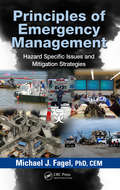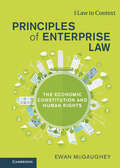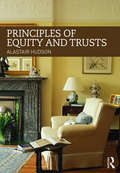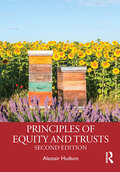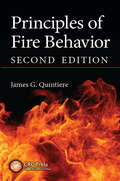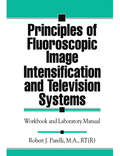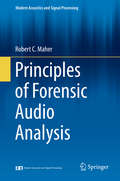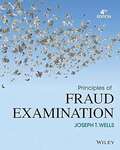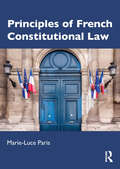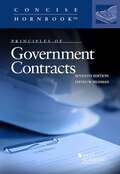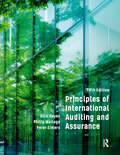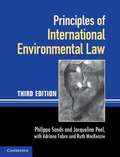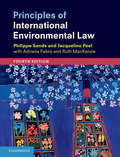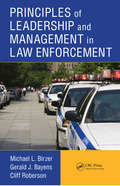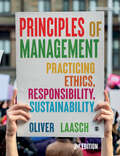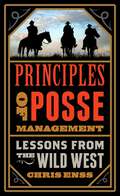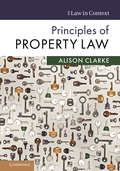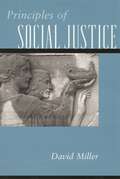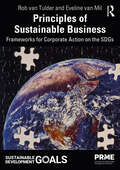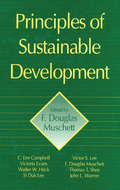- Table View
- List View
Principles of Emergency Management: Hazard Specific Issues and Mitigation Strategies
by Michael J. FagelPrinciples of Emergency Management: Hazard Specific Issues and Mitigation offers preparedness and mitigation recommendations for advanced emergency planning. Because disasters are so unpredictable, advance planning is needed to effectively respond to and mitigate against the potential effects of such events.Whether a disaster is natural or man-made
Principles of Enterprise Law: The Economic Constitution and Human Rights (Law in Context)
by Ewan McGaugheyMajor enterprises shape our lives in countless ways: big tech and 'surveillance media' that affect democratic debate, algorithms that influence online shopping, transport to work and home, energy and agriculture corporations that drive climate damage, and public services that provide our education, health, water, and housing. The twentieth century experienced swings between private and public ownership, between capitalism and socialism, without any settled, principled outcome, and without settling major questions of how enterprises should be financed, governed and the rights we have in them. This book's main question is 'are there principles of enterprise law', and, if they are missing, 'what principles of enterprise law should there be'? Principles of Enterprise Law gives a functional account of the 'general' enterprise laws of companies, investment, labour, competition and insolvency, before moving into specific enterprises, from universities to the military. It is an original guide to our economic constitution and human rights.
Principles of Equity and Trusts
by Alastair HudsonPrinciples of Equity and Trusts is a concise new textbook from Alastair Hudson - the author of the definitive classic, Equity and Trusts. Through clear and careful analysis, the author explains what the law is, its foundational principles, and its social and economic effect. By beginning with the core principles on which this field is based, even the most complex academic debates concerning express, resulting and constructive trusts, the family home, charities law and other equitable doctrines become comprehensible and interesting. This book offers a fresh, lively and often humorous account of Equity and Trusts. Through easy-to-follow worked examples and analysis of the case law, Alastair helps you to answer problem questions and to prepare coursework. The author shows how the law affects real people in real situations. Each chapter begins with a clear and concise introduction to the core principles. It contains numbered headings for ease of navigation and advice on studying this subject. Students also have access to Professor Hudson's ever-popular supporting website which has had hundreds of thousands of hits over the years. It has over 50 brief podcasts on key issues which have been specially re-recorded to coincide with the publication of this book. That website also contains detailed lectures, a variety of videos explaining the law and guidance on tackling assessments. Characterised by the passion and enthusiasm for his subject matter that make Alastair Hudson's classic textbook so popular, Principles of Equity and Trusts is sure to be a winner with both academics and students alike.
Principles of Equity and Trusts
by Alastair HudsonThis is the second edition of Principles of Equity and Trusts , the concise new textbook from Alastair Hudson – the author of the definitive classic, Equity and Trusts. Through clear and careful analysis, the author explains what the law is, its foundational principles, and its social and economic effect. By beginning with the core principles on which this field is based, even the most complex academic debates concerning express, resulting and constructive trusts, the family home, charities law and other equitable doctrines become comprehensible and interesting. This book offers a fresh, lively and often humorous account of Equity and Trusts. Through easy-to-follow worked examples and analysis of the case law, Alastair helps you to answer problem questions and to prepare coursework. The author shows how the law affects real people in real situations. Each chapter begins with a clear and concise introduction to the core principles. It contains numbered headings for ease of navigation and advice on studying this subject. Students also have access to Professor Hudson’s ever-popular supporting website, which has had hundreds of thousands of hits over the years. It has over 50 brief podcasts on key issues which have been specially re-recorded to coincide with the publication of this book. That website also contains detailed lectures, a variety of videos explaining the law and guidance on tackling assessments. Characterised by the passion and enthusiasm for his subject matter that make Alastair Hudson’s classic textbook so popular, Principles of Equity and Trusts is sure to be a winner with both academics and students alike.
Principles of Fire Behavior (Career Education Ser.)
by James G. QuintiereThis text covers the four forms of fire: diffusion flames, smoldering, spontaneous combustion, and premixed flames. Using a quantitative approach, the text introduces the scientific principles of fire behavior, with coverage of heat transfer, ignition, flame spread, fire plumes, and heat flux as a damage variable. Cases, examples, problems, selected color illustrations and review of mathematics help students in fire safety and investigation understand fire from a scientific point of view.
Principles of Fluoroscopic Image Intensification and Television Systems: Workbook and Laboratory Manual
by Robert J. ParelliThis unique workbook can be used as a stand-alone text or supplemental text for any course designed to enhance the work of radiologic technology students. It will also serve the needs of graduate radiographers as well as the physician in learning specific areas of the Fluoroscopic Image Intensifier such as:
Principles of Forensic Audio Analysis (Modern Acoustics and Signal Processing)
by Robert C. MaherThis book provides an expert introduction to audio forensics, an essential specialty in modern forensic science, equipping readers with the fundamental background necessary to understand and participate in this exciting and important field of study. Modern audio forensic analysis combines skills in digital signal processing, the physics of sound propagation, acoustical phonetics, audio engineering, and many other fields. Scientists and engineers who work in the field of audio forensics are called upon to address issues of authenticity, quality enhancement, and signal interpretation for audio evidence that is important to a criminal law enforcement investigation, an accident investigation board, or an official civil inquiry.Expertise in audio forensics has never been more important. In addition to routine recordings from emergency call centers and police radio dispatchers, inexpensive portable audio/video recording systems are now in widespread use. Forensic evidence from the scene of a civil or criminal incident increasingly involves dashboard recorders in police cars, vest-pocket personal recorders worn by law enforcement officers, smart phone recordings from bystanders, and security surveillance systems in public areas and businesses. Utilizing new research findings and both historical and contemporary casework examples, this book blends audio forensic theory and practice in an informative and readable manner suitable for any scientifically-literate reader. Extensive examples, supplementary material, and authoritative references are also included for those who are interested in delving deeper into the field.
Principles of Fraud Examination
by Joseph T. WellsPrinciples of Fraud Examination 4th Edition by Joe Wels contains engaging real-life case studies and an analysis of the complexity of frauds and fraudulent behavior incorporated throughout the book. This text provides a broad understanding of fraud—what it is and how it is committed, prevented, and resolved. Principles of Fraud Examination 4th Edition begins by providing an understanding of fraud examination methodology then documents the schemes used by executive, managers, and employees to commit fraud against their organizations. Case studies, complete with statistics and flowcharts, are provided for each chapter. <p><p>The primary focus of this text is maintained in the updated edition, with coverage of the actual accounting and human behaviors that lead to cases of accounting fraud. The 4th edition includes updates to reflect new and revised accounting standards and laws, updated statistics to include the most recent ACFE findings, and moderate changes to end of chapter material. Also included in the newest edition is updated coverage of recent examples of fraud accounting in the real world.
Principles of French Constitutional Law
by Marie-Luce ParisPrinciples of French Constitutional Law offers a concise and accessible account of the key principles and rules of constitutional law in the French legal system, presenting a muchneeded up-to-date overview of this rapidly changing subject.The textbook explores the five essential pillars that underpin the teaching of constitutional law, namely the institutions, legal history, case law, comparative law, and current affairs and developments. It is split into two core sections: Part I examines the basis of French constitutional law, the theoretical developments about key notions of constitutional law such as the state and the constitution, as well as the historical background to French constitutional law. Part II provides students with an understanding of the current Fifth Republic and how constitutional rules are adopted and applied, and how they affect other areas of law and politics. It offers a critical account of the 1958 Constitution’s past, present, and future by placing it in its political and socio-historical contexts and critically assessing contemporary developments and constitutional reforms.Given the growing expansion of this branch of law in the French legal system, this book will be essential reading for anyone studying French Law, Law with French, Comparative Constitutional Law, and European Legal Studies.
Principles of Government Contracts
by Steven FeldmanA continuation of the successful Government Contracts in a Nutshell, 6th, this expanded Principles of Government Contracts, 7th summarizes the Federal Acquisition Regulation System (FARS), improper business practices and personal conflicts of interest, publicizing contract actions, and competition requirements. Addresses acquisition planning, contractor qualifications, and descriptions of agency needs. Explains socio-economic policies, commercial items, contract types, options, sealed bidding, and contracting by negotiation. <p><p>Reviews intellectual property, cost accounting standards, cost principles, financing, protests, disputes, and appeals. Explores research and development contracting, construction and architect-engineer contracts, inspection and warranty, value engineering, delays, suspension of work, changes and equitable adjustments, subcontracting, and government contract terminations for default and convenience.
Principles of International Auditing and Assurance: 5th Edition
by Philip Wallage Rick HayesThis groundbreaking textbook redefines auditing education by seamlessly incorporating International Standards on Auditing (ISAs) and other IAASB assurance standards at its core, establishing a new paradigm in how auditing principles are taught. Recognized worldwide as the hallmark of auditing excellence, ISAs set the highest benchmarks for audit quality. This latest edition meticulously unfolds the evolution, application, and global integration of ISAs, alongside other assurance standards and key national frameworks, ensuring that the content remains at the forefront of international practices. It provides students with an extraordinary depth of insight into auditing and assurance, mirroring the very latest in contemporary practices and thought leadership. Key highlights:, Comprehensive exploration of the audit profession, essential concepts, the audit process across four stages, and specialized topics. Insight into the latest advancements in audit technology, including data analytics. Updates on the latest auditing and assurance standards, ensuring relevance and applicability. Expansion into a wide spectrum of assurance engagements, including a brand-new dedicated chapter on sustainability assurance. Practice questions styled like exams at the end of each chapter, facilitating effective review and learning. With its global perspective and adherence to the latest standards, this textbook is an essential resource for students aspiring to excel in the dynamic field of auditing.
Principles of International Environmental Law
by Philippe Sands Jacqueline Peel Adriana Fabra Ruth MackenzieThe third edition of this classic textbook offers comprehensive and critical commentary on international environmental law. It fully covers the key topics of the course and is clearly structured to include the history and framework in which international environmental law exists, key areas of regulation and implementation, links to other areas of law and future developments. It has been updated to incorporate all the latest developments in treaty and case law. Extensive feedback on previous editions results in a restructuring of material, including a new part focused on linkage to other areas of international law including human rights, international trade and foreign investment. There is also a new chapter on future developments charting the directions in which the subject is moving. Specialist authors writing on oceans, seas and fisheries and biodiversity add to the expertise of the two principal authors for an authoritative overview of the subject.
Principles of International Environmental Law: Frameworks, Standards, And Implementation (Studies In International Law)
by Philippe Sands Jacqueline Peel Adriana Fabra Ruth MacKenzieThis new and fully updated edition of Principles of International Environmental Law offers a comprehensive and critical account of one of the fastest growing areas of international law: the principles and rules relating to environmental protection. Introducing the reader to the key foundational principles, governance structures and regulatory techniques, Principles of International Environmental Law explores each of the major areas of international environmental regulation through substantive chapters, including climate change, atmospheric protection, oceans and freshwater, biodiversity, chemicals and waste regulation. The ever-increasing overlap with other areas of international law is also explored through examination of the inter-linkages between international environmental law and other areas of international regulation, such as trade, human rights, humanitarian law and investment law. Incorporating the latest developments in treaty and case law for key areas of environmental regulation, this text is an essential reference and textbook for advanced undergraduate and postgraduate students, academics and practitioners of international environmental law.
Principles of Kinesic Interview and Interrogation (ISSN)
by Stan B. WaltersHow do you interpret a person‘s behavior during their interview? Some people say it‘s an innate quality that can‘t be taught. But anyone who‘s read Stan Walters Principles of Kinesic Interview and Interrogation knows that is FALSE. The overwhelming success of the first edition and the numerous success stories credited to the book prove that
Principles of Leadership and Management in Law Enforcement
by Cliff Roberson Michael L. Birzer Gerald J. BayensEffective police organizations are run with sound leadership and management strategies that take into account the myriad of challenges that confront today‘s law enforcement professionals. Principles of Leadership and Management in Law Enforcement is a comprehensive and accessible textbook exploring critical issues of leadership within police agenci
Principles of Management: Practicing Ethics, Responsibility, Sustainability
by Oliver LaaschNow, more than ever, there is widespread understanding that business and management must move with the times and act responsibly in the world giving full consideration to people and planet, not just profit. Principles of Management: Practicing Ethics, Sustainability, Responsibility was the first official textbook of the United Nations global initiative network, Principles for Responsible Management Education (PRME). Now fully revised and updated with three brand new chapters on communicating, innovating and leading, this accessible and engaging textbook provides an introduction to management while empowering you to think ethically and sustainably in order to become a responsible manager. It also includes essential workplace skills for the 21st century and coverage of the various management occupations that you will go on to fill after your studies. Exclusive interviews with management pioneers and professionals help bring theories and concepts to life throughout the text as do the all new case studies which include Lego, Patagonia and Greta Thunberg. Worksheets and exercises make for an active learning experience in the supporting online resources. It includes coverage of the UN’s Sustainable Development Goals (SDGs) which are central to business education and practice today. The textbook can be used for introductory management courses as well as courses that cover business ethics, business and society, corporate social responsibility (CSR), sustainability and responsible management.
Principles of Management: Practicing Ethics, Responsibility, Sustainability
by Oliver LaaschNow, more than ever, there is widespread understanding that business and management must move with the times and act responsibly in the world giving full consideration to people and planet, not just profit. Principles of Management: Practicing Ethics, Sustainability, Responsibility was the first official textbook of the United Nations global initiative network, Principles for Responsible Management Education (PRME). Now fully revised and updated with three brand new chapters on communicating, innovating and leading, this accessible and engaging textbook provides an introduction to management while empowering you to think ethically and sustainably in order to become a responsible manager. It also includes essential workplace skills for the 21st century and coverage of the various management occupations that you will go on to fill after your studies. Exclusive interviews with management pioneers and professionals help bring theories and concepts to life throughout the text as do the all new case studies which include Lego, Patagonia and Greta Thunberg. Worksheets and exercises make for an active learning experience in the supporting online resources. It includes coverage of the UN’s Sustainable Development Goals (SDGs) which are central to business education and practice today. The textbook can be used for introductory management courses as well as courses that cover business ethics, business and society, corporate social responsibility (CSR), sustainability and responsible management.
Principles of Politics
by Joe OppenheimerModern rational choice and social justice theories allow scholars to develop new understandings of the foundations and general patterns of politics and political behavior. In this book, Joe Oppenheimer enumerates and justifies the empirical and moral generalizations commonly derived from these theories. In developing these arguments, Oppenheimer gives students a foundational basis of both formal theory and theories of social justice, and their related experimental literatures. He uses empirical findings to evaluate the validity of the claims. This basic survey of the findings of public choice theory for political scientists covers the problems of collective action, institutional structures, citizen well-being and social welfare, regime change and political leadership. Principles of Politics highlights what is universal to all of politics and examines both the empirical problems of political behavior and the normative conundrums of social justice.
Principles of Posse Management: Lessons from the Old West for Today's Leaders
by Chris EnssPrinciples of Posse Management tells the stories of the lawmen and leaders of the Old West who organized citizens in the pursuit of law and order. This collection of tales reveals what Wyatt Earp, Bat Masterson, and other legends of the old west knew about leadership with a clever twist on the classic shoot-em-up, black-hats-vs-white-hats tale.
Principles of Property Law (Law in Context)
by Alison ClarkePrinciples of Property Law offers a critical and contextual analysis of fundamental property law, providing students with the tools to enable them to make sense of English land law rules in the context of real-world applications. This new book adopts a contextual approach, placing the core elements of a qualifying law degree property and land law course in the context of general principles and practices as they have developed in the UK, and other jurisdictions in response to a changing societal relationship with a variety of factors. Also drawing on concepts of property developed by political theorists, economists and environmentalists, Principles of Property Law gives students a clear understanding of how property law works, why it matters, and how the theory connects with the real world. Suitable for undergraduates studying property and land law in England, Wales and Northern Ireland, as well as postgraduate students seeking an accessible analysis.
Principles of Shared Responsibility in International Law
by André Nollkaemper André Nollkaemper Ilias Plakokefalos Jessica N. M. Schechinger Ilias PlakokefalosThe Shared Responsibility in International Law series examines the underexplored problem of allocation of responsibilities among multiple states and other actors. The International Law Commission, in its work on state responsibility and the responsibility of international organisations, recognised that attribution of acts to one state or organisation does not exclude possible attribution of the same act to another state or organisation, but has provided limited guidance on allocation or reparation. From the new perspective of shared responsibility, this volume reviews the main principles of the law of international responsibility as laid down in the Articles on State Responsibility and the Articles on Responsibility of International Organizations, such as attribution of conduct, breach, circumstances precluding wrongfulness and reparation. It explores the potential and limitations of current international law in dealing with questions of shared responsibility in areas such as military operations and international environmental law.
Principles of Social Justice
by David MillerDeveloping a new theory for social justice, David Miller, in this book, argues that principles of justice must be understood contextually, with each principle finding its natural home in a different form of human association.
Principles of Sustainable Business: Frameworks for Corporate Action on the SDGs (The Principles for Responsible Management Education Series)
by Rob van Tulder Eveline van MilThe basic function of companies is to add value to society. Profits are a means to an end, not an end in itself. The ability of companies to innovate, scale and invest provides them with a powerful base for positive change. But companies are also criticized for not contributing sufficiently to society’s grand challenges. An increasingly VUCA (Volatile, Uncertain, Complex and Ambiguous) world creates serious governance gaps that not only require new ways of regulation, but also new ways of doing business. Can companies effectively contribute to sustainable development and confront society’s systemic challenges? Arguably the most important frame to drive this ambition was introduced and unanimously adopted in 2015: the Sustainable Development Goals (SDGs). The SDG-agenda not only defines a holistic set of global goals and targets, but also foundational principles to guide meaningful action to their achievement by 2030. Multinational companies have signed up to the SDGs as the world’s long-term business plan. Realizing the SDGs provides a yearly $12 trillion investment and growth opportunity, while creating hundreds of millions of jobs in the process. But progress is too slow – witnessing society’s inability to deal with pressing human, ecological, economic and health crises – whilst the vast potential for societal value creation remains underutilized. This book provides a timely account of the systemic, strategic and operational challenges that need to be addressed to enhance the effectiveness of corporate involvement in society, by using the SDGs as the leading principles-based framework for actionable, powerful and transformative change. Principles of Sustainable Business is written for graduate and postgraduate (executive) students, policymakers and business professionals who want to understand the complex challenges of global sustainability. It shows how companies can design and implement SDG-relevant strategies at three levels: the macro level, to assess whether the SDGs present wicked problems or opportunities; the micro level, to develop and operationalize innovative business models, design new business cases and navigate organizational transition trajectories; and the meso level, to develop fit-for-purpose cross-sector partnering strategies. Principles of Sustainable Business presents innovative tools embedded in a coherent sequence of analytical frameworks that can be applied in courses for students, be put into practice by business professionals and used by action researchers to help companies contribute to the Decade of Action.
Principles of Sustainable Business: Frameworks for Corporate Action on the SDGs (The Principles for Responsible Management Education Series)
by Rob van Tulder Eveline van MilThe basic function of companies is to add value to society. Profits are a means to an end, not an end in itself. The ability of companies to innovate, scale and invest provides them with a powerful base for positive change. But companies are also criticized for not contributing sufficiently to society’s grand challenges. An increasingly VUCA (Volatile, Uncertain, Complex and Ambiguous) world creates serious governance gaps that not only require new ways of regulation, but also new ways of doing business. Can companies effectively contribute to sustainable development and confront society’s systemic challenges?Arguably the most important frame to drive this ambition was introduced and unanimously adopted in 2015: the Sustainable Development Goals (SDGs). The SDG-agenda not only defines a holistic set of global goals and targets, but also foundational principles to guide meaningful action to their achievement by 2030. Multinational companies have signed up to the SDGs as the world’s long-term business plan. Realizing the SDGs provides a yearly $12 trillion investment and growth opportunity, while creating hundreds of millions of jobs in the process. But progress is too slow – witnessing society’s inability to deal with pressing human, ecological, economic and health crises – whilst the vast potential for societal value creation remains underutilized. This book provides a timely account of the systemic, strategic and operational challenges that need to be addressed to enhance the effectiveness of corporate involvement in society, by using the SDGs as the leading principles-based framework for actionable, powerful and transformative change.Principles of Sustainable Business is written for graduate and postgraduate (executive) students, policymakers and business professionals who want to understand the complex challenges of global sustainability. It shows how companies can design and implement SDG-relevant strategies at three levels: the macro level, to assess whether the SDGs present wicked problems or opportunities; the micro level, to develop and operationalize innovative business models, design new business cases and navigate organizational transition trajectories; and the meso level, to develop fit-for-purpose cross-sector partnering strategies. Principles of Sustainable Business presents innovative tools embedded in a coherent sequence of analytical frameworks that can be applied in courses for students, be put into practice by business professionals and used by action researchers to help companies contribute to the Decade of Action.
Principles of Sustainable Development
by F. Douglas MuschettThis book brings together the collective thinking, ecological perspectives, and experiences of individuals from air quality, land use and transportation disciplines who are working to advance and operationalize sustainable development.
